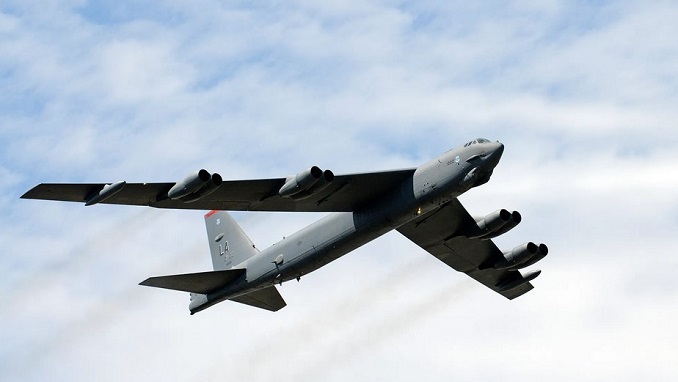The United States flew strategic bombers over the Gulf on Wednesday for the second time this month, in what Washington says is a show of force meant to deter Iran from attacking American or allied targets in the Middle East, Al Jazeera reported.
One senior US military officer said the flight by two Air Force B-52 bombers was in response to signals that Iran may be planning attacks against US allied targets in neighboring Iraq or elsewhere in the region in the coming days, even as President-elect Joe Biden prepares to take office.
The officer was not authorized to publicly discuss internal assessments based on sensitive intelligence and spoke The Associated Press on condition of anonymity.
The B-52 bomber mission, flown round trip from an Air Force base in North Dakota, reflects growing concern in Washington, in the final weeks of President Donald Trump’s administration, that Iran will order further military retaliation for the US killing last January 3 of top Iranian military commander General Qassem Soleimani.
Iran’s initial response, five days after the deadly US drone strike, was a ballistic missile attack on a military base in Iraq that caused brain concussion injuries to about 100 American troops.
Adding to the tension was a rocket attack last week on the US Embassy compound in Baghdad by Iranian-supported Shia armed groups. No one was killed, but Trump tweeted afterwards that Iran was on notice.
“Some friendly health advice to Iran: If one American is killed, I will hold Iran responsible. Think it over,” Trump wrote on December 23.
In announcing Wednesday’s bomber flight, the head of US Central Command said it was a defensive move.
“The United States continues to deploy combat-ready capabilities into the US Central Command area of responsibility to deter any potential adversary, and make clear that we are ready and able to respond to any aggression directed at Americans or our interests,” said General Frank McKenzie, the commander of Central Command. “We do not seek conflict, but no one should underestimate our ability to defend our forces or to act decisively in response to any attack.”
He did not mention Iran by name.
In advance of the announcement, the senior US military officer who spoke on condition of anonymity said that US intelligence has detected recent signs of “fairly substantive threats” from Iran, and that included planning for possible rocket attacks against US interests in Iraq in connection with the one-year anniversary of the Soleimani killing.
The US is in the process of reducing its troop presence in Iraq from 3,000 to about 2,500. Trump ordered that the reduction be achieved by January 15; officials say it is likely to be reached as early as next week.
The United States also has picked up signs that Iran may be considering or planning “more complex” and broader attacks against American targets or interests in the Middle East, the senior US military officer said, adding that it represented the most concerning signs since the days immediately following the Soleimani killing.
The officer cited indications that advanced weaponry has been flowing from Iran into Iraq recently and that Shia militia leaders in Iraq may have met with officers of Iran’s Quds force, previously commanded by Soleimani.
The US officer said Iran might have its eye on economic targets, noting the September 2019 missile and drone attack on Saudi oil processing facilities. Iran denied involvement but was blamed by the Washington for that attack.
In recent weeks the US military has taken a range of steps designed to deter Iran, while publicly emphasizing that it is not planning, and has not been instructed, to take unprovoked action against Iran.
Last week, a US Navy guided-missile submarine made an unusual transit of the Strait of Hormuz, the strategic waterway between Iran and the Arabian Peninsula.
Earlier in December, a pair of B-52 bombers from Barksdale Air Force Base in Louisiana flew what the military calls a “presence” mission over the Gulf – a demonstration of US force and a signal of US commitment to the region, but not an attack mission. That flight was repeated this week, with two B-52s flying nonstop from Minot Air Force Base in North Dakota and heading home Wednesday after cruising over the western side of the Gulf.
Tensions with Iran escalated with the killing in November of Mohsen Fakhrizadeh, an Iranian scientist named by the West as the leader of the Islamic Republic’s disbanded military nuclear program. Iran has blamed Israel for the killing, but US officials are concerned that any Iranian retaliation could hit American interests.
